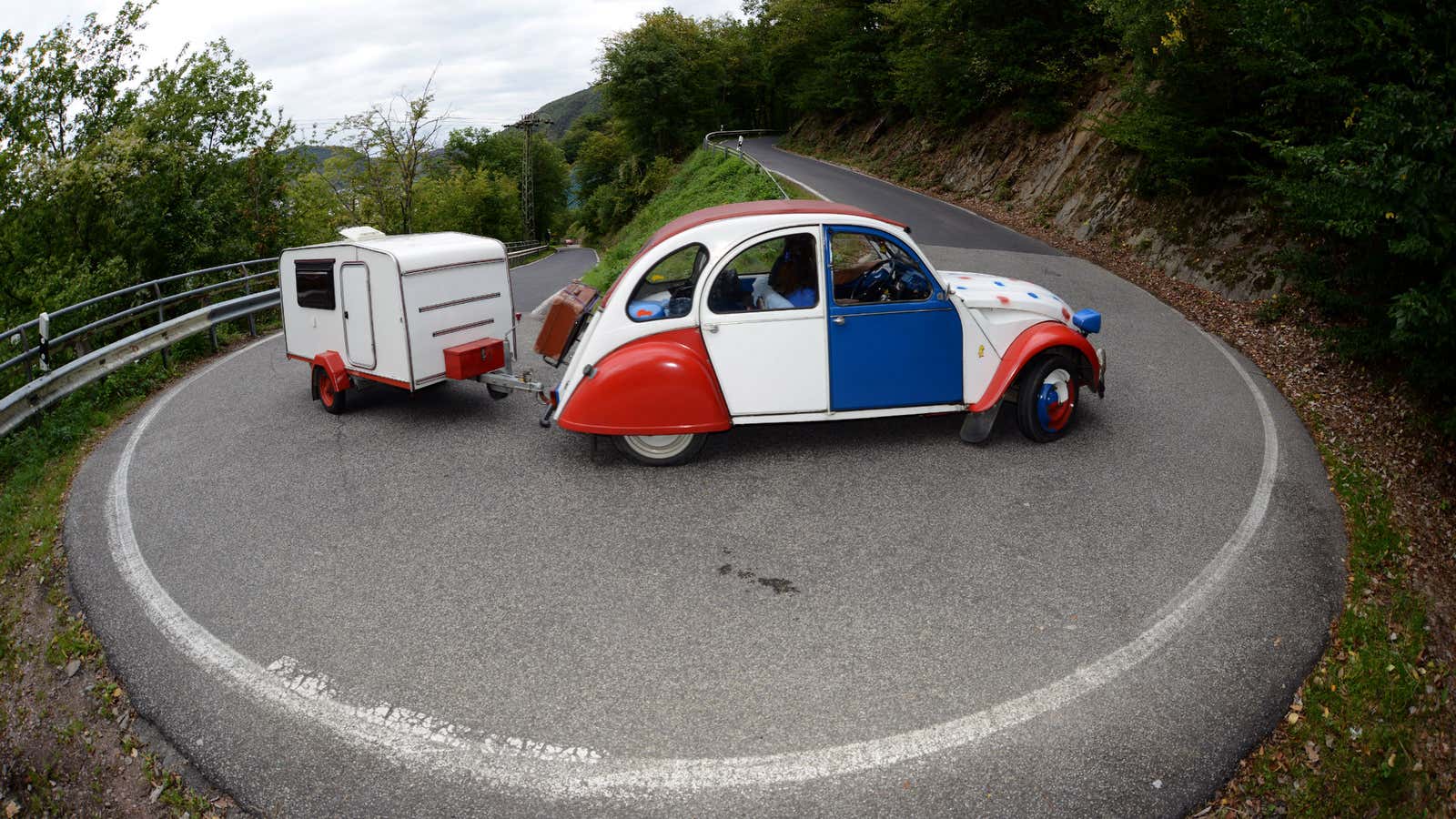General Motors Co. and PSA Peugeot Citroen, in search of a snug institutional solution to rising gas prices and plummeting car sales, dispatched five senior executives to a supercharged steering committee in Germany eight months ago. Their mission: create a global Franco-American alliance to stem the red tide of idle manufacturing plants, discounted automobiles, and thousands of laid-off workers. Perhaps it could also help GM pay back the outstanding $24 billion of the $49.5 billion bailout it received from the US Treasury Department, which now controls 30% of its shares.
Fresh on the heels of the French government fuel-injecting €7 billion into PSA’s crippled finance arm, Banque PSA Finance, the transatlantic car coalition, last week announced its joint corporate intention to build small, cheap and low CO2 emission vans, midsize cars, and multipurpose vehicles on four new platforms by 2016.
Don’t expect a modern twist on the Art Decoish van popular with post-war baguette delivery drivers or the vintage versatility of Captain Haddock’s vehicle in the “Adventures of Tintin.” A new-age Judge convertible with a fuel-efficient turbo diesel engine? Nope. Instead, prepare yourself for a Franglaismobile, the automotive version of a 16th arrondissement cherry soufflé made with Detroit’s own Faygo soda pop.
Once upon a time, Citroen motorcars from the grand salon popularized in French gangster films to the cheap, humble and amusing 2CV were works of art that drove themselves out of European showrooms. Not to be outdone, the backroom hot rodders at General Motors turned out surfer cars disguised as wood-paneled family station wagons. Land yachts like the GM Futurliner and the rolling thunder Vette Nomad showed GM was a car company with jazzy dreams.
No longer. Nowadays PSA Peugeot Citroen of Paris and GM of Detroit are bailout buddies who share a nightmare: Drowning in debt and with nobody wanting to buy their cars.
The secret to success in the auto business is making cool cars people like, not sexless committee cars built on a platform of rusted logic that require subtitles. Daimler and Chrysler, Nissan and Renault and, most recently, Chrysler and Fiat tried that routine.
PSA Chief Executive Officer Philippe Varin and GM President and CEO Dan Akerson are spinning their wheels, stuck in the mud and victims of an economy of scale in which flow charts and management consultants instruct struggling manufactures to churn out commodity cars that can price-point with Chinese jalopies. Build them cheap, so cheap, that each company can make back its margin.
That is not cool. It’s also not very market smart.
“If we want to recruit the best engineers and designers to make the next generation of cool and fuel-efficient cars—cars that buyers can be passionate about—we’re not going to lure them with an offer to work on a tool lathe,” says a Peugeot executive, who asked to remain anonymous because he was not authorized to speak for the company. “They want to work on the Le Mans team. They want to build real cars.”
The hot and hybrid Peugeot 908 HDu FAP diesel, for instance, took first and second place at the 2009 24 Hours of Le Mans. Profitable Audi ate poor Peugeot’s diesel smoke along the La Sarthe track. Then, months away from this year’s race, Peugeot executives called the team home and pulled the plug on its explosively fast 908 HY hybrid battery-powered Le Mans racer.
Back on US 1, GM’s lithium-fueled Chevrolet Volt explodes in flames.
Varin, the poster boy of the French Grande Ecole technocracy, and Akerson, a graduate of the U.S. Naval Academy and the London School of Economics, must recall that nobody wanted to drive Renault’s Le Car or the Chevy Vega, among other clunkers. Inexpensive doesn’t mean cheap; fuel efficiency doesn’t negate the need for speed and the absolute necessity for jaw-dropping form and function.
Throw the management consultants out of your garage. Tell the human resource department to track down the likes of a Peter Brock, the engineer and designer behind the Shelby Daytona Cobra, the architect of the original Corvette Stingray. Remember your legacies, celebrate your provenances and assemble your cleverest 21st century designers and brightest green engineers. Lock them in a room and don’t let them out until Brock says so.
As the late and great car customizer Big Daddy Roth would say, you guys are now acting like Rat Finks. Gentlemen, start your engines, please.
